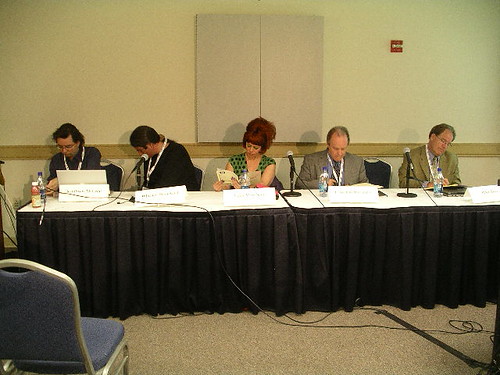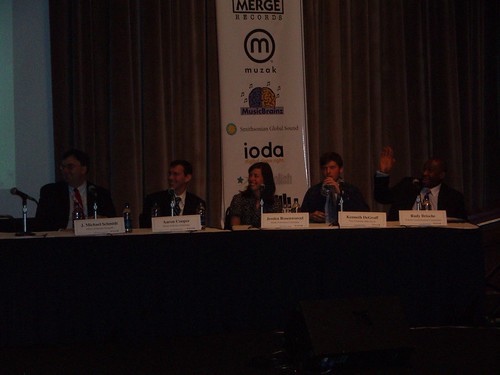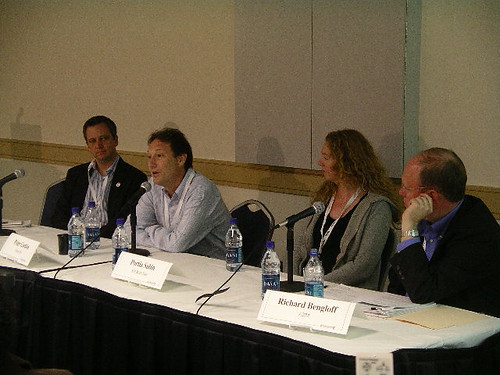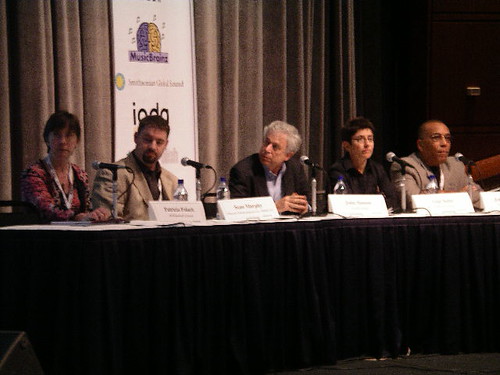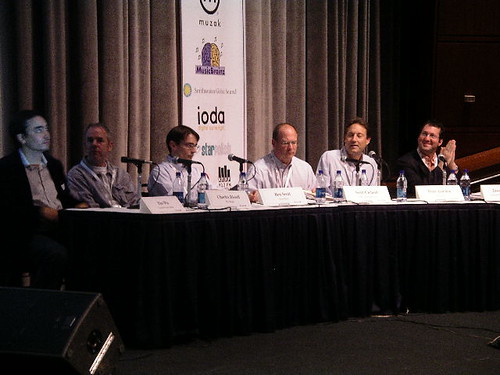David Bither Senior Vice President, Nonesuch Records
Rosemary Carroll Esq. Partner, Carroll, Guido & Groffman
Jim Griffin Chief Executive Officer, Onehouse
Mac McCaughan Musician and Co-owner, Merge Records
Bob Mould Artist
Ralph Simon Chairman Emeritus & Founder, Mobile Entertainment Forum Americas, Mobilium Group & The MEF
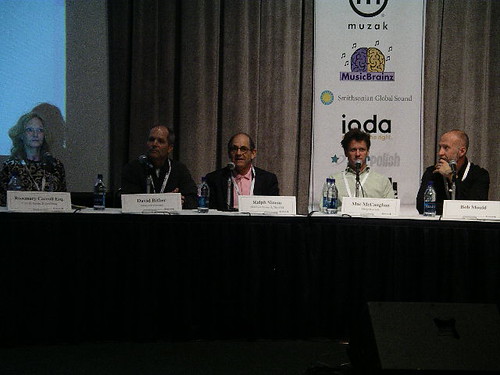
09:50AM EST - JG thanks Jenny Toomey and the other FMC founders, introduces the panelists.
09:58AM EST - JG: David, how is business? 30% down is a scary figure. How bad are things, at your label?
10:01AM EST - DB: When something like Tower Records goes out of business, it affects all of us. At the same time, there's more vitality in the music community than there has been in a long time. As a company, we follow our hearts with the music that we love. Our business has been pretty steady within this dynamic context; that can be attributed by the quality of the artists we work with. The fact that we exist 40 years later, doing the things we do...that's my answer.
10:05AM EST - MM: I don't think that's the industry standard, though. I think Nonesuch could survive without Warner. What do they provide you?
DB: Well, we could probably do what we do without Warner. That's just how we were born and raised.
10:07AM EST - JG: Mac, how does your perspective differ?
MM: Business is great, the last few years have been the best ever. I attribute it to the artists we have and the records they've put out in the last few years. People may be buying less bad records, but I don't see them buying less good records.
10:10AM EST - JG: Rosemary, what's your perspective on the difference between the majors and the independents today?
RC: Five years ago, a buzzed band today would immediately want to go to a major. I don't think a major label is a good place for an artist to be today. It's a combination of the majors not doing a good job and being engaged in a contractual land-grab for rights and contracts. Now an artist has to cut the label in on his merchandising, touring, and more in addition to his masters
10:15AM EST - JG: Bob, are you able to make a living as a musician?
BM: I'm blessed to say that I can. When I was a kid, buying music was a sacred ritual. Today, somebody downloads a hundred songs in a day, they are icons on a desktop, and maybe five end up in their iTunes folder.
JG: Where do technology and music meet?
10:21AM EST - DB: Obviously we live in a world full of technological change, but our focus is someplace else - the quality of our artists.
MM: It is sad to see the devaluation of art, but Merge sells records to music fans, people who feel sad about the same thing. Nonesuch does as well, regardless of who the parent company is. I have a hard time caring about ringtones. We're more focused on putting out good records.
RS: Ringtones have evolved in a similar way to radio edits. The ringtone has its place in promoting an artist, but it should be seen in a wider landscape of graphics and other tools.
10:26AM EST - JG: Hasn't technology made it voluntary to pay for music? What kind of future does that leave the business?
DB: Wilco is a classic story. When they were dropped by Warner and came to Nonesuch, we had emails from hundreds of fans saying they were glad to purchase Yankee Hotel Foxtrot, though they had already owned it for months.
RS: Isn't a new role of the record label to find that trigger point, and inspire that?
DB: There's a difference between creating a hit and a career. One lasts five minutes, and another hopes to last a lifetime.
10:30AM EST - JG: Rosemary, is there something legislative that can be done?
RC: I don't think you can stuff the genie back in the bottle. Restrictive laws wouldn't work, and they wouldn't be passed.
JG: Bob, how will we listen to music in the future? What do you think of the recent Rick Rubin piece in the Sunday NYT?
BM: New gadgets are fleeting. You can't break a band with a ringtone. Social networking is big right now, but those come and go as well. Five years ago, the music world was full of skyscrapers. Now you can see the horizon.
10:30AM EST - MM: I don't think the ubiquity of music access is especially beautiful. I don't want to listen to music on myspace or a computer. MP3s sound terrible. There is so much music out there, that you still have to work to find the good stuff.
DB: That being said, I think part of the role of a company like Merge is to be a curator of good music.
RC: Major labels are becoming more flexible. Lucinda Williams just did five nights, her manager wanted to record one night, press a few hundred CDs, sell them the next night, then sell the remainder on her website. I never thought they would go for it, but they did.
10:40AM EST - JG: Bob, you DJ in clubs, and the club pays the performers. Is it time for terrestrial radio to start paying a performance right?
BM: I don't think that's going to happen.
JG: David, how do you feel about radio stations taking your music and playing it without paying you?
DB: I wish they were taking it and playing it. Independent and college radio helps, but its never been a big interest for us. We don't have a radio promotions department. We built our business without it.
RC: I've long thought that there should be a performance right for terrestrial radio. I think it's obvious. The performer brings so much to the music; not just the songwriter.
10:40AM EST - Questions from the audience:
Q: What's the ratio between physical and digital sales at Merge?
MM: It's definitely greater today than it was a few years ago. Then, digital sales would start at 30%-40% and then taper off to 10% or so. More recently, it tends to stay around 30%. It's artist by artist, however. Caribou is still around 40%-50% digital, whereas the Arcade Fire is 20% to 25%. But we've seen things settling around 30%.
Q: Going back to the question of people's willingness to pay for music, do you think that's a demographic thing? (Tim Wu)
DB: I think it's definitely different, a case where a lot of older fans have more money than time, and aren't interested in spending hours seeking out free music.
JG: To wrap up, an axiom I've come across is that if some kind of technology happens in the first 13 years of your life, you think its quite normal. If it happens between 13 and 40, it's so interesting it might just become your career. If it happens after you turn 40, it should be illegal. We'd all better move quickly to keep up.

